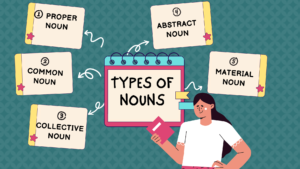Definition
A noun is the name of any person, place, thing, quality, or group. For example, Ryan, Shivani, Delhi, New York, kindness, etc.
Types of Noun
Nouns can be classified broadly into five types: proper nouns, common nouns, collective nouns, material nouns, and abstract nouns. Let us discuss these types in detail further.

Proper Nouns
A name given to a particular person, place, or thing is a proper noun. Proper nouns always begin with a capital letter.
Examples:
- His name is Karan. (name of individual)
- This is my rabbit, Bunny. (name of a pet)
- Sridhar just returned from Delhi. (name of the place)
Common Nouns
A generic name given to a place, person, or material is a common noun. These do not begin with a capital letter unless they are used to begin a sentence.
Examples:
- I had some blue pens. (Common object).
- He has always lived in cities. ( Common place).
- Only ten students are there in the class. (Common group).
- The gas cylinder is exhausted. (Common items).
Collective Nouns
A name given to a group of individuals or objects is a collective noun. These do not begin with a capital letter if they are not the first word of a sentence.
Collective Names for a group of Animals
- A troop of monkeys.
- A swarm of bees
- A school of fish.
Collective Nouns for a group of Individuals
- An orchestra of musicians.
- A jury of judges.
- A class of students.
Collective Nouns for a set of Items/Things
- A pair of shoes.
- A bunch of keys.
- A bouquet of flowers.
Abstract Nouns
Abstract nouns are names of emotions, ideas, feelings, states of mind, actions, and qualities. You cannot hold or touch them as they are not physical.
Examples:
- Honesty is the best policy.
- Childhood is the most memorable part of one’s life.
- Growth is an important characteristic of living beings.
Material Noun
A word that names a substance that is tangible but cannot be counted is called material noun.
Examples:
- This ring is made up of gold.
- Water is an essential element of life.
- Sugar is missing in the recipe.
Some other Categories of Nouns
Nouns can be classified based on numbers, countability, and gender as well. Let us understand them.
Countable and Uncountable Nouns
Names of things or objects that can be counted and can be in numbers are called countable nouns. For example, pen, pencil, ball, page, etc.
Names of things or objects that cannot be counted or in numbers are called uncountable nouns. For example, milk, water, gold, etc.
Singular and Plural Nouns
Nouns that represent a single person/ object/entity are called singular nouns. For example, boy, city, flower, school, brush, etc.
Nouns that represent more than one person/ object/entity are called plural nouns. For example, boys, cities, flowers, schools, brushes, et
Gender Nouns (Masculine, Feminine, Neuter, and Common)
Nouns that name the males of a given species are called masculine nouns. For example, boy, man, horse, etc.
Nouns that name the females of a given species are called feminine nouns. For example, girl, woman, mare, etc.
Nouns that name lifeless objects are called neuter nouns. For example, book, pen, notebook, etc.
Nouns that denote either a male or a female belong to the common gender. For example, child, human, etc.
Do you Know?
- Some nouns have the same singular and plural forms. For example, fish, sheep, deer, etc.
- Some nouns are always plural. For example, pants, scissors, etc.
Frequently Asked Questions
1. What is a Noun Clause?
A noun clause is a group of words that functions as a noun in a sentence. It can serve as a subject or the object of the verb. For example, consider the following sentence: I hope that I shall be there in time. In this statement, ‘I shall be there in time’ functions as the object of the verb ‘hope’.
2. How does a Noun Phrase Differ from a Noun Clause?
A phrase is a group of words in a sentence that does not make complete sense. A noun phrase is a phrase that acts as a noun and functions as the subject or object of the verb. Whereas a noun clause in turn is a group word that contains a subject as well as a predicate, makes complete sense, and functions as a noun.
3. What are Mass Nouns?
Nouns that name a substance that cannot be counted at all are called mass nouns. For example, rice, sand, milk, etc. These nouns are quantified by using prefixes such as some, a little, etc.
 Mission Statement
Mission Statement
“Empower every student to achieve full potential”
88Guru has been established with the social objective of making quality video-based learning material available to all Indian students. Technology, Connectivity and Social Media are rapidly changing the world of Education and we wish to lead the transformation of the tuition industry in India.
88Guru is the perfect complement to the current tuition model. 88Guru creates a wonderful opportunity for children and parents to bond while engaging in a valuable learning activity. It also provides the complete curriculum at your fingertips for those moments when you need some help at short notice. We believe that this mode of tuition could be transformational, adding hours to a child's day while providing complete control over the learning process.
Every course is taught by the best teachers from India's top schools and conducted in an engaging manner to keep students involved. The e-learning process consists of video-based instructions, computer-graded assignments, and a dashboard which allows the student and parent to track progress.



